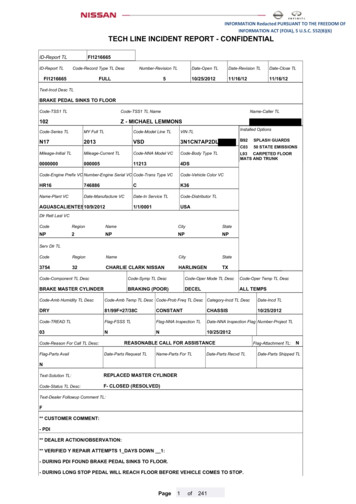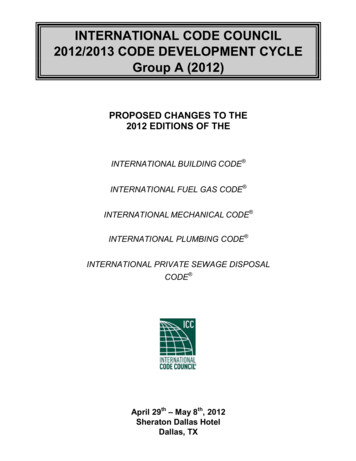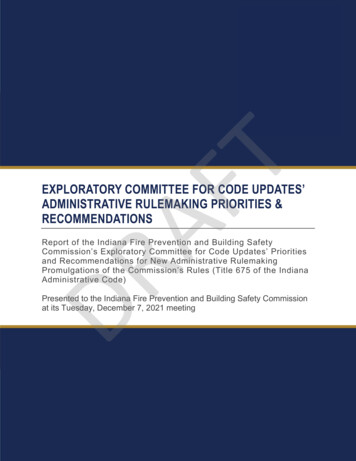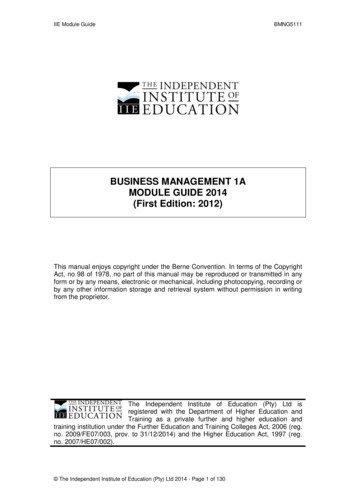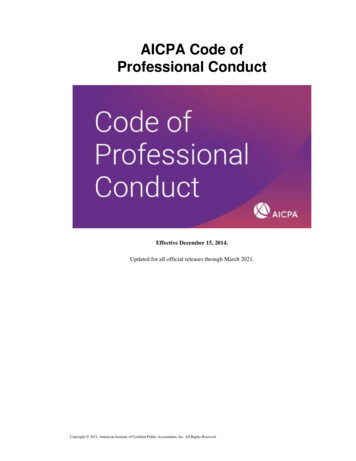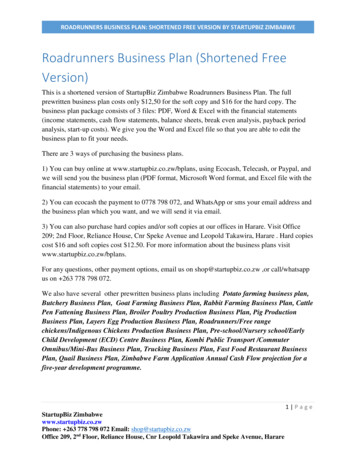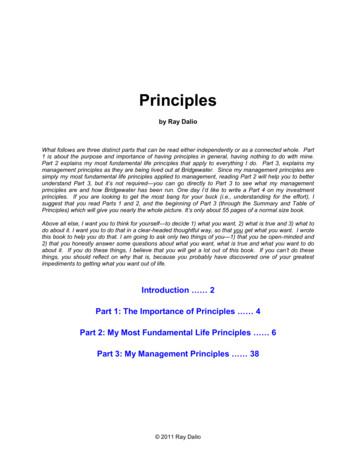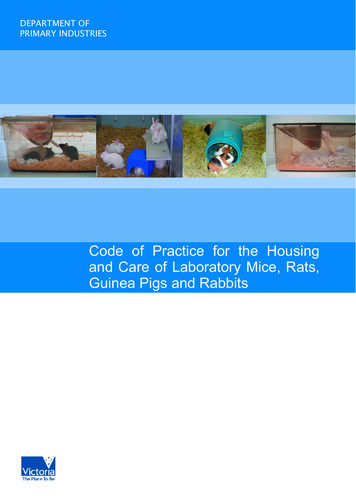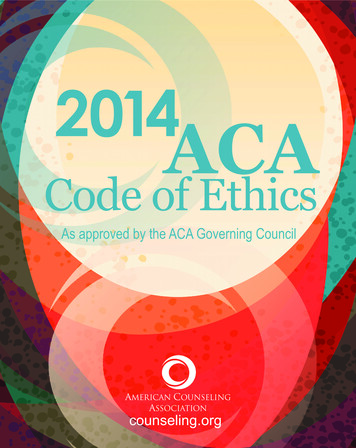
Transcription
UnileverCode of Business Principlesand Code ardingInformationEngagingExternally01
ContentsThe Code and our Standard of ConductCountering CorruptionOur Framework04Avoiding Conflicts of Interest16Occupational Health & Safety24A message from Alan Jope05Anti-Bribery17Respect, Dignity & Fair Treatment25The Code of Business Principles06Gifts & Hospitality18Living the Code08Accurate Records, Reporting & Accounting20Legal Consultation10Responsible Risk Management12Responsible Innovation13Product Safety & Product Quality14Safeguarding InformationRespecting PeopleProtecting Unilever’s Physical & FinancialAssets & Intellectual PropertyAnti-money Laundering2122Engaging ExternallyGlossaryProtecting Unilever’s Information28Responsible Marketing35Preventing Insider Trading29Responsible Sourcing & Business Partnering36Competitors’ Information30Fair Competition37Personal Data & Privacy31Contact with Government, Regulators &39Use of Information Technology32Non-governmental Organisations (NGOs)Political Activities & Political Donations41External Communications –42Glossary44The Media, Investors & AnalystsThe Codeof ngExternallyExternallyGlossary0202
The Code andour Standardof ConductOur FrameworkA message from Alan JopeThe Code of Business PrinciplesLiving the CodeLegal ConsultationResponsible Risk ManagementResponsible InnovationProduct Safety & Product QualityThe Codeof ngExternallyExternallyGlossary0303
Our FrameworkOurValuesOur Values of Integrity,Respect, Responsibility andPioneering are the simpleststatement of who we are.They govern everythingwe do.The Codeof BusinessPrinciplesCode ofBusinessPrinciplesCodePoliciesOur Code of BusinessPrinciples is a simple ethicalstatement of how we shouldoperate. We publish thisexternally and expect allothers who work with usto set themselves equally highprinciples.Our Code Policies define theethical behaviours that we allneed to demonstrate whenworking for Unilever. Theyare mandatory. While theseare for internal use, we alsopublish them externally insupport of ernallyExternallyGlossary0404
Foreword from Alan JopeWelcome to the most importantdocument we have at Unilever– our Code of Business Principles.up’ in this connected, social media worldhas become more complicated than ever.What’s more, the accelerating pace ofchange, and the greater speed with whichWhen I think of my time at Unilever, andwe must operate, often intensifies theseconsider why I have stayed for over 30challenges.years, I put it down to two core reasons: ourgeographical diversity and the values of thebusiness. Values that give us the instinct todo the right thing and to treat each otherwith respect.The Code of Business Principles is ourguidebook for putting our values intopractice. It sets out a clear standard ofconduct to ensure that we always makethe right choice, providing a frameworkHaving a strong set of values that respectof simple “musts” and “must nots”. It’s apeople, society, and the planet has alwaysdocument which not only protects Unilever,been at the heart of Unilever, and willand each and every one of us, but will helpcontinue to be critical to building ourus to have a meaningful impact on the livespurpose-led, future-fit company. Our licenceof millions of people across our value chain.to operate and our ability to competesuccessfully, are dependent on each andevery one of us living these values, day inand day out.Much of Unilever’s strength lies in the sharedvalues of our people. Behaving with integrityis part of who we are. Thank you for yourdiligence and for helping to create a fairerYet we know that in this volatile andand more principled world as we workunpredictable world, we face numeroustowards delivering our vision of being thechallenges in doing so. Challenges, but notglobal leader in sustainable business.excuses. Many of the countries in which weoperate rank poorly in global corruptionindices. The digital world increasinglypresents us with new considerations formanaging cyber and data security, andhow our company and our brands ‘showThe Codeof BusinessPrinciplesRead and re-read our Code.It matters.Thank lyExternallyGlossary0505
The Code of Business Principles (1 of 2)Code of Business Principles and Code PoliciesIntroductionEmployeesAt Unilever we believe in growingresponsibly and sustainably.Unilever is committed to a workingenvironment that promotes diversity,inclusion, life-long learning and equalopportunity, including for those withdisabilities. We believe in a workplacewhere there is mutual trust, respect forhuman rights and no discrimination.We support the physical and mentalwellbeing of our employees, ensuringsafe working conditions.Our Code of Business Principles defines thenon- negotiables for all our employees. Itcodifies our values, making clear what isexpected from our people.Through living our Code, we will bring ourvalues and purpose to life, every day ineverything we do.Standard of ConductWe conduct our operations with honesty,integrity and openness, and with respectfor the human rights and interests ofour employees.We shall similarly respect the legitimateinterests of those with whom we haverelationships.We are committed to providingtransparency across all our operationsensuring stakeholders trust what we do.Obeying the LawUnilever companies and employeesare required to comply with the lawsand regulations of the countries in whichwe operate.The Codeof BusinessPrinciplesWe will recruit, employ and promoteemployees on the sole basis of thequalifications and abilities needed for thework to be performed.We will provide employees with a totalremuneration package that meets orexceeds the legal minimum standardsand in line with industry standards inthe markets in which we operate. We arecommitted to giving employees a livingwage, ensuring that they can meet theireveryday needs.We will provide transparent, fair andconfidential procedures for employeesand third parties to raise concerns. We willnot retaliate against whistle-blowers oremployees that raise issues with us.ConsumersUnilever is committed to providingpurposeful branded products and serviceswhich consistently offer value in terms ofprice and quality, and which are safe fortheir intended use. Products and serviceswill be accurately and properly labelled,advertised and communicated.ShareholdersBusiness PartnersUnilever is committed to establishingmutually beneficial relations with oursuppliers, customers and businesspartners. In our business dealingswe expect our partners to adhere tobusiness principles consistent with ourown. This means compliance with ourthird party policies and a commitmentto working with us to address issues thatnegatively impact society and the planet.We will work with these partners to raisestandards so that their employees arepaid a living wage and are not subjectto forced, compulsory, trafficked orchild labour.Unilever will conduct its operations inaccordance with internationally acceptedprinciples of good corporate governance.We will provide timely, regular andreliable information on our activities,structure, financial situation andperformance to all shareholders.We will not use any form of forced,compulsory, trafficked or child labour.We respect the dignity of the individualand the right of employees to freedom ofassociation and collective bargaining.We will maintain good communicationswith employees through company-basedinformation and consultation nallyExternallyGlossary0606
The Code of Business Principles (2 of 2)Code of Business Principles and Code PoliciesCompliance – Monitoring –ReportingCompliance with these principles is anessential element in our business success.The Unilever Board is responsible forensuring these principles are appliedthroughout Unilever.The Chief Executive Officer is responsiblefor implementing these principles and issupported in this by the Global Code andPolicy Committee which is chaired by theChief Legal Officer.Day-to-day responsibility is delegatedto all senior management of thegeographies, divisions, functionsand operating companies. They areresponsible for implementing theseprinciples, supported by local BusinessIntegrity Committees.Assurance of compliance is given andmonitored each year. Compliance issubject to review by the Board supportedby the Corporate ResponsibilityCommittee and for financial andaccounting issues the Audit Committee.Any breaches of the Code must bereported. The Board of Unilever will notcriticise management for any loss ofbusiness resulting from adherence tothese principles and other mandatorypolicies. Provision has been madefor employees to be able to reportin confidence and no employee willsuffer as a consequence of doing so.The Codeof BusinessPrinciplesCommunity InvolvementPublic ActivitiesConflicts of InterestsUnilever strives to be a trusted corporatecitizen and, as an integral part of society,to fulfil our responsibilities to the societiesand communities in which we operate.Unilever companies are encouraged topromote and defend their legitimatebusiness interests.All employees and others working forUnilever are expected to avoid personalactivities and financial interests whichcould conflict with their responsibilities tothe company.InnovationIn our scientific innovation to meetconsumer needs we will respect theconcerns of our consumers and of society.We will work on the basis of soundscience, applying rigorous standardsof product safety.CompetitionUnilever believes in vigorous yet faircompetition and supports the developmentof appropriate competition laws. Unilevercompanies and employees will conducttheir operations in accordance with theprinciples of fair competition and allapplicable regulations.The PlanetUnilever is committed to makingcontinuous improvements in themanagement of our environmental impactand to the longer-term goal of developinga sustainable business.Unilever will work in partnership withothers to promote environmental care,increase understanding of environmentalissues and disseminate good nilever will co-operate with governmentsand other organisations, both directlyand through bodies such as tradeassociations, in the developmentof proposed legislation and otherregulations which may affect legitimatebusiness interests.Unilever neither supports politicalparties nor contributes to the funds ofgroups whose activities are calculated topromote party interests.Bribery & CorruptionUnilever does not give or receive,whether directly or indirectly, bribes orother improper advantages for businessor financial gain. No employee may offer,give or receive any gift or payment whichis, or may be construed as being, a bribe.Any demand for, or offer of, a bribe mustbe rejected immediately and reported tomanagement.Employees must not seek gain forthemselves or others through misuse oftheir positions.DataUnilever is committed to the responsible,ethical and fair use of data.We collect and use data in line with ourvalues, applicable laws and with respectfor privacy as a human right.NoteIn this Code the expressions ‘Unilever’and ‘Unilever companies’ are used forconvenience and mean the Unilever Groupof companies comprising Unilever N.V.,Unilever PLC and their respective subsidiarycompanies. The Board of Unilever means theDirectors of Unilever N.V. and Unilever PLC.Unilever accounting records andsupporting documents must accuratelydescribe and reflect the nature of theunderlying transactions. No undisclosedor unrecorded account, fund or asset willbe established or agingExternallyExternallyGlossary0707
Living the Code (1 of 2)Code of Business Principles and Code PoliciesAs a purpose-led company, ourvalues are the foundation of oursuccess and essential to achievingour ambition of making sustainableliving commonplace.Living the Code means to put ourvalues into practice and reiterateour commitment to doing good;this helps us to deliver valuewith values. Our consumers andcustomers trust us for doingbusiness with integrity. This is oneof our greatest assets, and tomaintain our reputation, requiresthe highest standards of behaviour.Unilever’s Code of BusinessPrinciples (the Code), and thepolicies that support it (CodePolicies), set out the standardsrequired from all our employees.Unilever also requires its thirdparty business partners and theiremployees to adhere to businessprinciples consistent with our own.These expectations are set out inUnilever’s Responsible Sourcing andBusiness Partnering Policy that underpinour third-party compliance programme.The Codeof BusinessPrinciplesBreaching the Code or Code Policiescould have very serious consequencesfor Unilever and for individuals involved.Where illegal conduct is involved, thesecould include significant fines for Unilever,imprisonment for individuals andsignificant damage to our reputation.This Code Policy explains how to ensure theCode and all Code Policies are understoodand followed by all our employees andothers working for Unilever. It confirmseveryone’s responsibility to speak up andreport suspected or actual breaches, andoutlines how such situations must bemanaged. Any failure to comply with theCode and any of the Code Policies is takenvery seriously by Unilever and may result indisciplinary action, including dismissal andlegal action.References in the Code and Code Policiesto ‘employees’ include the following: Unilever employees, whether full time,part time, fixed term, permanent ortrainees Persons with statutory director rolesor equivalent responsibilities Unilever employees of joint ventures Employees of new acquisitions, from thedate that the company is ving the Code is a team effort. The Codeand Code Policies cannot cover everyeventuality, particularly as laws differbetween countries. If specific situationsare not expressly covered, the spirit of theCode and Code Policies must be upheldby exercising common sense and goodjudgement, always in compliance withapplicable laws.MustsAll employees must: Ensure they know and understandthe requirements of our Code andCode Policies Undertake relevant training as requiredby their Line Manager or BusinessIntegrity Officer Follow the Code and Code Policies: if theyare unsure of how to interpret these orhave any doubts about whether specificbehaviours meet the standards requiredthey must seek the advice of their LineManager or Business Integrity Officer Immediately report actual or potentialbreaches of the Code or Code Policies,whether relating to them, colleaguesor people acting on Unilever’s behalfand whether accidental or deliberate.This includes instances where businesspartners’ behaviour may not meet thesame ingExternallyExternallyGlossary0808
Living the Code (2 of 2)Code of Business Principles and Code PoliciesMustsIn addition, those at Manager level andabove must:Their Line Manager is usually the rightperson to report potential or actualbreaches. If this is not appropriate, theymust talk to one of the following:– Their Business Integrity Officer– A member of the Business IntegrityCommittee in the country whereconcerns occur– Unilever’s confidential Code SupportLine (where allowed by local law),by telephone or web using thetelephone number or web addresscommunicated locally If asked not to report a potential breachby their Line Manager or anotheremployee, they must immediatelyreport it to their Business IntegrityOfficer and / or the Code Support Line Lead by example, setting a strong tonefrom the top, showing they are familiarwith the Code and Code Policies andtaking steps to embed a culture ofintegrity across all operations Complete an annual Code declaration Ensure that all their team members,including new joiners:– Have read the Code and Code Policies– Have completed any relatedmandatory training– Understand how to raise concernsand / or report actual or suspectedbreaches Deliver training that the BusinessIntegrity Committee or their LineManager has asked of them, e.g.Business Integrity Moments, face-toface briefings and team discussions Ensure that anyone who raisesconcerns, or highlights potential oractual breaches, receives support andrespect and that there is no retaliationagainst them Ensure that concerns raised are takenseriously and addressed promptly,treating related information withdiscretion and discussing them withtheir Business Integrity Officer assoon as possible to determine theappropriate course of action includingwhom else to inform Collaborate further and complete anydocumentation (e.g. case informationand lessons learnt) as may berequired of them by their BusinessIntegrity OfficerMust notsEmployees must not: Ignore or fail to report situations wherethey believe there is or may be a breachof the Code or Code Policies Attempt to prevent a colleague fromreporting a potential or actual breach orask them to ignore an issue Retaliate against any person whoreports a potential or actual breach Discuss any potential or actual breachunder investigation with other persons,unless this has been cleared with theinvestigation team Insofar as a breach may have occurredwithin their operations, consider whatadditional communications, trainingor changes to business controls andprocedures are necessary to reduce thelikelihood of similar breaches occurring Offer guidance and support about theCode and Code Policies to their teamwhere needed and escalate unresolvedquestions to their Business IntegrityOfficerThe Codeof ngExternallyExternallyGlossary0909
Legal Consultation (1 of 2)Code of Business Principles and Code PoliciesEmployees must at all times complywith laws and regulations that applyto the countries in which Unileveroperates. Ignorance of the law is noexcuse. Timely legal consultation isessential to ensure that Unilever’slegitimate business interests andopportunities are protected.This Code Policy sets out how andin what circumstances employeesmust seek legal advice from UnileverLegal Group.MustsHeads of all market Cluster/countryboards or senior leadership teams andheads of all category, corporate andfunctional leadership teams must ensurethe relevant Legal Business Partner is amember of that leadership team uponrequest and / or that they have an openinvitation to attend all team meetings andreceive copies of all associated agendasand minutes.All employees must: Immediately notify their Line Manager(or other appropriate person – seeCode Policy on Living the Code) andtake legal advice if they suspect ordiscover any illegal activity in relationto Unilever’s operations or associatedactivities involving third parties.The Codeof ngExternallyExternallyGlossary1010
Legal Consultation (2 of 2)Code of Business Principles and Code PoliciesMusts Promptly seek advice from theirLegal Business Partner in the followingsituations:- Commercial contracts, leases,licences and transactions –Commercial contracts for goods orservices (unless Legal Group hasexpressly delegated authority tothe business or set up a route fordirect consultation of an externallegal advisor); Contracts relating tointellectual property, such as, licencesfor technology, trademarks, jointdevelopment or technical assistancecontracts; Treasury transactions, forexample, raising equity or debt, assetleasing, derivative transactions (suchas currency hedging or interest rateswaps) or guarantees of Treasurytransactions; Transactions involvingmergers, acquisitions, disposals orjoint ventures11- Litigation and regulatory action –Civil litigation, such as employmentor contractual disputes, whetherthreatened or actual, by or againsta Unilever company or employee,including commencement ofor settlement of such litigation;Criminal prosecutions, whetherthreatened or actual, by or againsta Unilever company or employee,or at Unilever’s instigation;The Codeof BusinessPrinciplesCommunication with governmentor regulatory bodies aboutinvestigations, including unexpectedinvestigations, or where Unileveris seeking regulatory action, suchas non-compliant labelling actionsthrough local governmental bodies(see Code Policy on Contact withGovernment, Regulators and NonGovernmental Organisations)- Competition/antitrust – Complianceissues or questions involvingcompetition/antitrust laws, such astrade terms, exclusivity arrangementsor pricing; Meetings, contacts,collaboration, agreements or otheractivity, including participationin trade associations or industrygroupings (formal and informal or adhoc), which may involve the exchangeof information with a competitoror restrictions on competition (seeCode Policies on Fair Competition,Competitors’ Information)- Communication – Press releasesthat could impact Unilever’sreputation or create legal liability,or contain ‘inside’ or ‘price sensitive’information (see Code Policy onPreventing Insider spectingRespectingPeoplePeople- Claims, brands, trademarks,marketing materials – Productclaims and marketing materials,including advertising, promotionalmaterials, packaging and labelling,trade materials, advertorials, pointof-sale materials, and web content;Clearance for use of all brand names,marks, logos, slogans, celebrityendorsements and sponsorships;Maintenance, protection anddisposal of trademarks, copyrightsand domain names used by thebusiness; Competitor challenges toclaims, brands, trademarks either byor against a Unilever company- Employment – Issues relating to noncompete obligations, employmentdisputes and terminations and nonroutine employment contract terms- Safety – Product tampering orcounterfeiting; Consumer complaintsthat may lead to legal disputes;Potential product recalls; Consumer,product, workforce or environmentalsafety incidents that could have legalimplications- Legal or governance structures –Changes to, or issues around, legal orgovernance structures at geographicor corporate level, such as changesin capital structures or Boardmembership, public company filingsand arrangements/relationships withthird-party ormationEngagingEngagingExternallyExternally- Bribery and corruption – Bribery orcorruption issues, including relatedallegations or uncertainty aboutsituations that may have bribery orcorruption implications (see CodePolicy on Anti-Bribery)Employees must use their common senseand judgement in situations not coveredabove: if they are unsure, they mustalways err on the side of caution andconsult Legal Group.Must notsEmployees must not Do anything that Legal Group hasadvised is illegal and/ or unlawful.Where an activity is not illegaland / or unlawful but legal advicehighlights significant risks for Unilever,such as litigation, they must notproceed without express senior linemanagement authorisation Appoint a private investigatorwithout prior approval from theirGeneral CounselEmployees outside Legal Group must not Appoint, manage or remove externallegal counsel or pay any legal fees thatdiffer from the fee structures agreed byLegal GroupGlossary1111
Responsible Risk ManagementCode of Business Principles and Code PoliciesUnilever takes an embedded approachto risk management which puts risk andopportunity assessment at the core ofthe leadership team agenda. Unileverdefines risks as actions or events thathave the potential to impact our ability toachieve our objectives. Unilever identifiesand mitigates downside risks such as lossof money, reputation or talent as wellas upside risks such as failure to deliverstrategy if it does not strengthen brandequities or grow in growing channels.Unilever’s Risk Management approachis embedded in the normal course ofbusiness with a set of global Principlesof Risk Management with localimplementation.Its structural elements include: Governance of Unilever, organisationalstructure and delegation of authorityRisk management is integral toUnilever’s strategy and to theachievement of Unilever’s longterm goals. Our success as anorganisation depends on ourability to identify and exploit theopportunities generated by ourbusiness and the markets Unileveroperates in.The Codeof BusinessPrinciples Vision, Strategy and Objectives Code of Business Principles, CodePolicies and StandardsMusts Complete an annual holistic riskdiscussion during which:All managers and above must implementUnilever’s Principles of Risk Managementas follows: Accountability: they must identify andmanage the risks that relate to their role Risk Appetite: they must determinethe level of risk, after theimplementation of controls, that theyare prepared to accept such that thereis not a significant threat to achievingtheir objectives- Key business risks for which they areresponsible are identified;- How those risks are being managed isreviewed;- Any gaps in their desired risk appetiteare identified. Perform regular reviews and ensurerisks are mitigated as desired.All project leaders of transformationalprojects must, together with their teams: Risk Mitigation: they must put adequatecontrols in place, and ensure that theyare operational, in order to deliver theirobjectives Identify the key risks associated withtheir project achieving its objectivesAll members of leadership teams must: Review progress with the projectsteering group. Prepare risk mitigation plans Ensure that the risk managementactivities, as outlined in Unilever’sRisk and Control Frameworks, arebeing undertaken for their areas ofresponsibility Risk and Control Frameworks Performance management andoperational processes execution Compliance and assurance nallyExternallyGlossary1212
Responsible InnovationCode of Business Principles and Code PoliciesUnilever conducts responsible, safe andsustainable research and innovation,which fully respects the concerns ofour consumers and society. In meetingconsumer needs, Unilever’s innovationsare based on sound science andtechnology, and reflect high standardsand ethical principles.Unilever has global standards that applyto all research and innovation, includingon: the safe and sustainable design ofnew products, processes and packaging;product and brand development;open innovation collaborations; andpublication of our scientific research.MustsAll employees involved in scientific researchand innovation activity must comply withall standards relevant to their area of work,notably in order to:Innovation is fundamental toUnilever’s business success anda core part of our global strategy.The integrity and objectivity ofour Science are a key foundationfor our approach to responsibleinnovation. Safety is nonnegotiable.The Codeof rruption Ensure that risks for consumer safety,occupational safety and the environmentare suitably assessed and managed Ensure appropriate specifications of rawmaterials, products and packaging Ensure effective management ofconsumer safety risks from food allergens Ensure research on human subjectsis conducted to the highest ngEngagingExternallyExternally Uphold Unilever’s commitment toeliminate animal testing withoutcompromising on consumer safety (seeDeveloping Alternative Approaches toAnimal Testing) Ensure the integrity, robustness,objectivity and transparency of allscientific research and collaborationswith external partners (see Unilever’sPosition on Science with Objectivity andIntegrity) Maintain and make accessible recordsof all research, including study protocolsand data, and their interpretation anddecisions made Raise any concerns about actual orpotential non-compliance with thisCode Policy with their Business IntegrityOfficer, Line Manager or their relevantBusiness Partner in R&DMust notsEmployees must not: Deliver presentations or publicationsthat have not been approved viainternal clearance procedures Collaborate with third parties outsidea structured and approved contractualframeworkGlossary1313
Product Safety & Product QualityCode of Business Principles and Code PoliciesUnilever’s reputation and successis founded upon providing safehigh quality products and servicesthat meet all applicable standardsand regulation, both internal andexternal within the end to endvalue chain.All employees have a role to playin ensuring that the products andservices we provide meet and /or exceed the expectations of ourconsumers and customers.Unilever will take prompt andtimely action to recall products orservices that don’t meet
Respecting People ngaging xternally Countering Corruption afeguarding Information 02 Contents The Code and our Standard of Conduct Countering Corruption Respecting People
